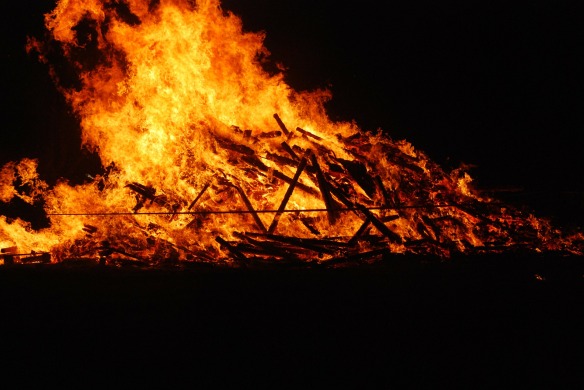Recap
Synopsis
The Original Old English
My Translation
A Quick Interpretation
Closing

What Beowulf’s hall probably looked like after the dragon attacked. Image from https://pixabay.com/en/funeral-pyre-fire-may-fire-flame-232504/
Back To Top
Recap
Last week, the dragon continued its attack on the countryside. It destroyed people’s homes and towns as it sought vengeance against the thief and his lord.
Back To Top
Synopsis
Beowulf is told about the dragon melting his hall. This leads Beowulf to wonder what he’s done to deserve this.
Back To Top
The Original Old English
“þa wæs Biowulfe broga gecyðed
snude to soðe, þæt his sylfes ham,
bolda selest, brynewylmum mealt,
gifstol Geata. þæt ðam godan wæs
hreow on hreðre, hygesorga mæst;
wende se wisa þæt he wealdende
ofer ealde riht, ecean dryhtne,
bitre gebulge. Breost innan weoll
þeostrum geþoncum, swa him geþywe ne wæs.”
(Beowulf ll.2324–2332)
Back To Top
My Translation
“Then was Beowulf told of that terror,
in a voice trembling with speed and truth, he heard that his own home,
the best of buildings, had been melted in a surge of fire,
the gift seat of the Geats. That good man
was sorrowful at heart, sunken into great grief when he heard that news.
In that moment his thoughts turned to his past,
he wondered if he had acted contrary to the old laws of the Ruler,
the Eternal Lord, severely offended them; within his breast welled up
dark thoughts, as was not customary for him.”
(Beowulf ll.2324–2332)
Back To Top
A Quick Interpretation
This must be the first bad thing that happens to Beowulf. Ever. Why else would he only now wonder how he offended his god?
After all, that’s the only reason anything bad would happen to him.
At least as far as we know. There is a fifty year gap in the story here, so maybe there is something that Beowulf did do that’s knocked him out of god’s favour.
Or, maybe, fate always goes as it must.
If this is the first bad thing to happen to Beowulf, then of course it’s going to cause Beowulf to look into his heart of hearts and search out the darkness. Like anyone else, he probably got comfortable with things always going his way. So when things start to move against him it seems quite natural that he would jump to some sort of supernatural cause.
Actually, this turn and Beowulf’s reaction to it could have come from a lot of incidents in the Old Testament, particularly the Books of Job or of Exodus. In fact, the latter of these was a favourite of Anglo-Saxon writers.
That might seem like a strange book of the Bible to pick as a favourite, but they had a good reason. In the Jews of Egypt the Anglo-Saxons saw people who were exiled from what had become their homeland and were forever searching for a place to call their own. That sums up how a lot of Anglo-Saxon writers and thinkers seemed to have thought of themselves.
The Angles and the Saxons had come over from what is now Germany, after all. And they had settled into and gotten comfortable in Britain. But that’s where the Celts were at home.
Anyway, that’s just a little sidebar on some of the Beowulf poet or scribes’ possible influences.
Getting back to the concept of fate, I like to think that in his long-lived comfort Beowulf has probably not thought much about fate over the last fifty years. Saying something like “fate goes ever as it must” is really cool before a high stakes, low odds fight, but it doesn’t quite have the same impact when you say it before starting a diplomatic meeting.
Another point of interest: When he was young, Beowulf seems to have mentioned god and fate in the same breath quite often. But now he doesn’t hear about his hall being destroyed and think “huh…well, fate goes as it must” but instead he thinks only of god. Maybe this is the poet saying that it’s all well and good to think in terms of fate when young, since it rules over this world, but once you get closer to death and the next world, it’s better to turn to those with power over that.
In any case, how Beowulf reacts to this calamity says a lot about how he’s changed. His first thoughts aren’t about going after the dragon. Instead he worries about himself and his past offenses. Which brings a question to mind.
Throughout the poem Beowulf is made out to be a great guy. What do you think these offenses he mulls over are? What could those dark thoughts that well up from within be about?
My own guess is that he has a troubled past with a woman. The fact that there’s not a single named female character in this part of the poem just seems like too much of an omission to me. The poet could be leaving something out to leave room for Beowulf’s more macho ending.
But those are just my thoughts. Do you agree? Disagree? Have your own theory?
Let me know in the comments!
And if you enjoyed this post, please give it a like. Also, be sure to hit the follow button so that you never miss another part of this poem.
Back To Top
Closing
Next week, we get a glimpse of the old Beowulf as he resolves to go against the dragon. And uses science (…sort of) to do so.
You can find the next part of Beowulf here.

